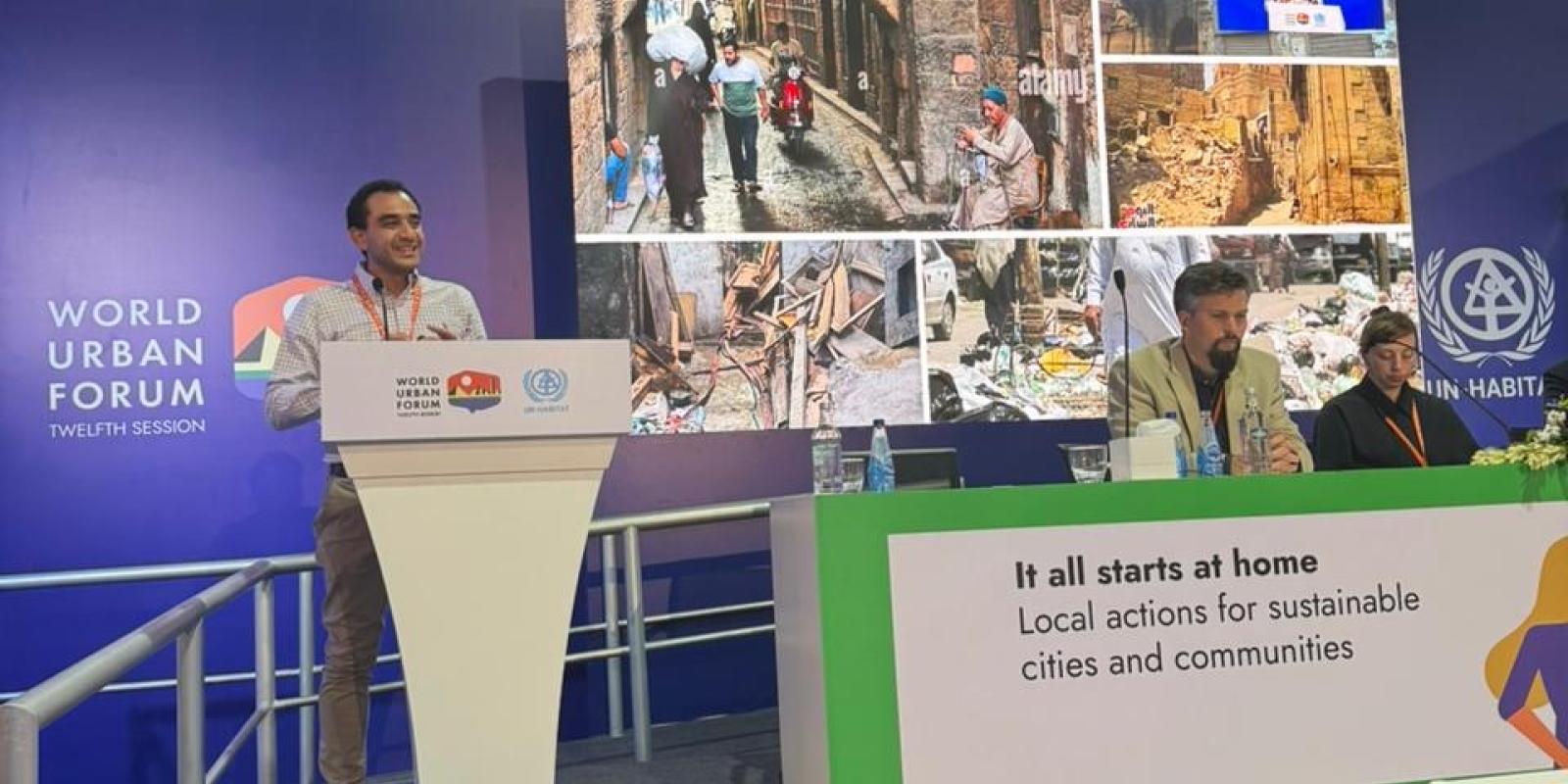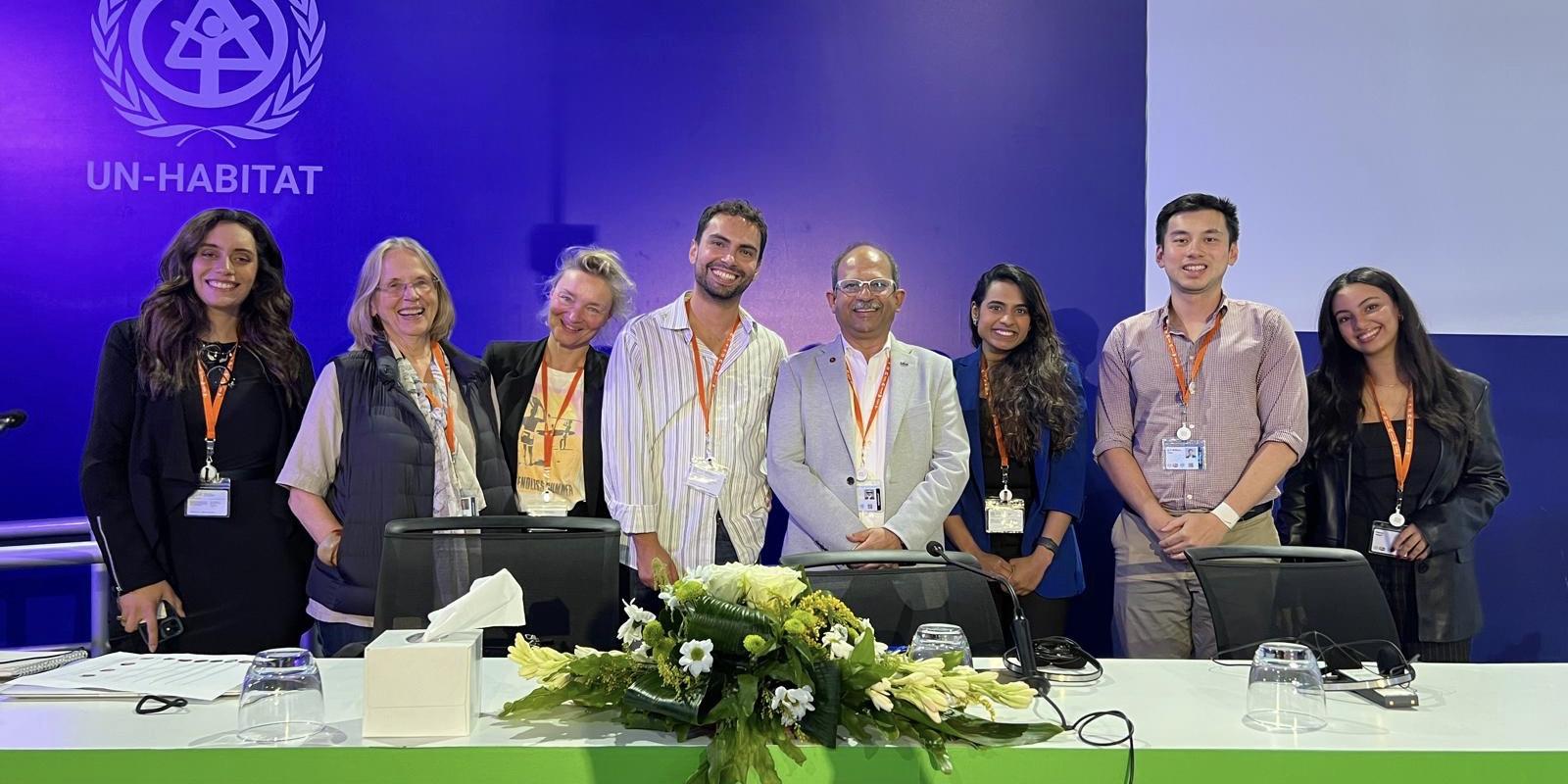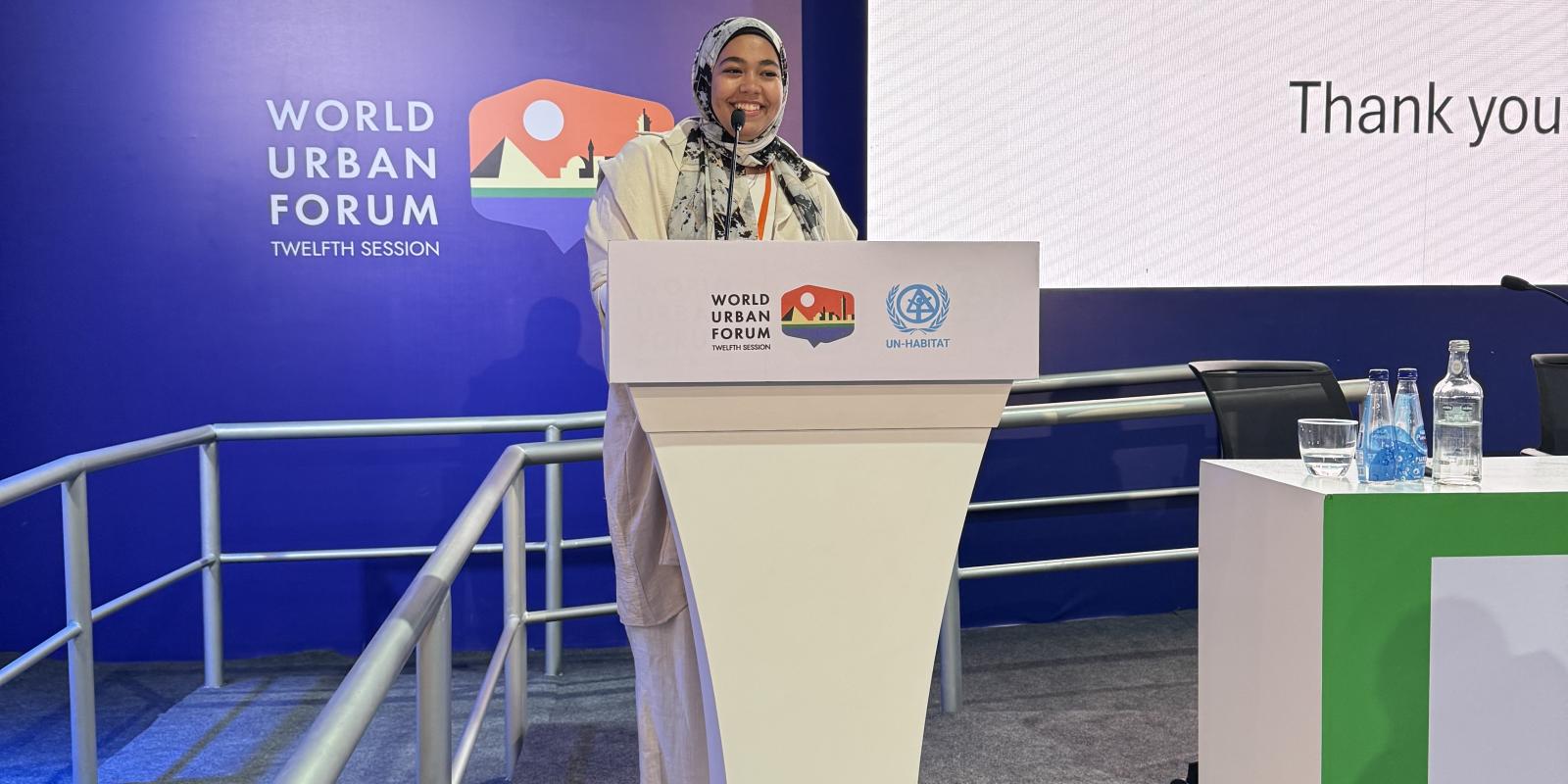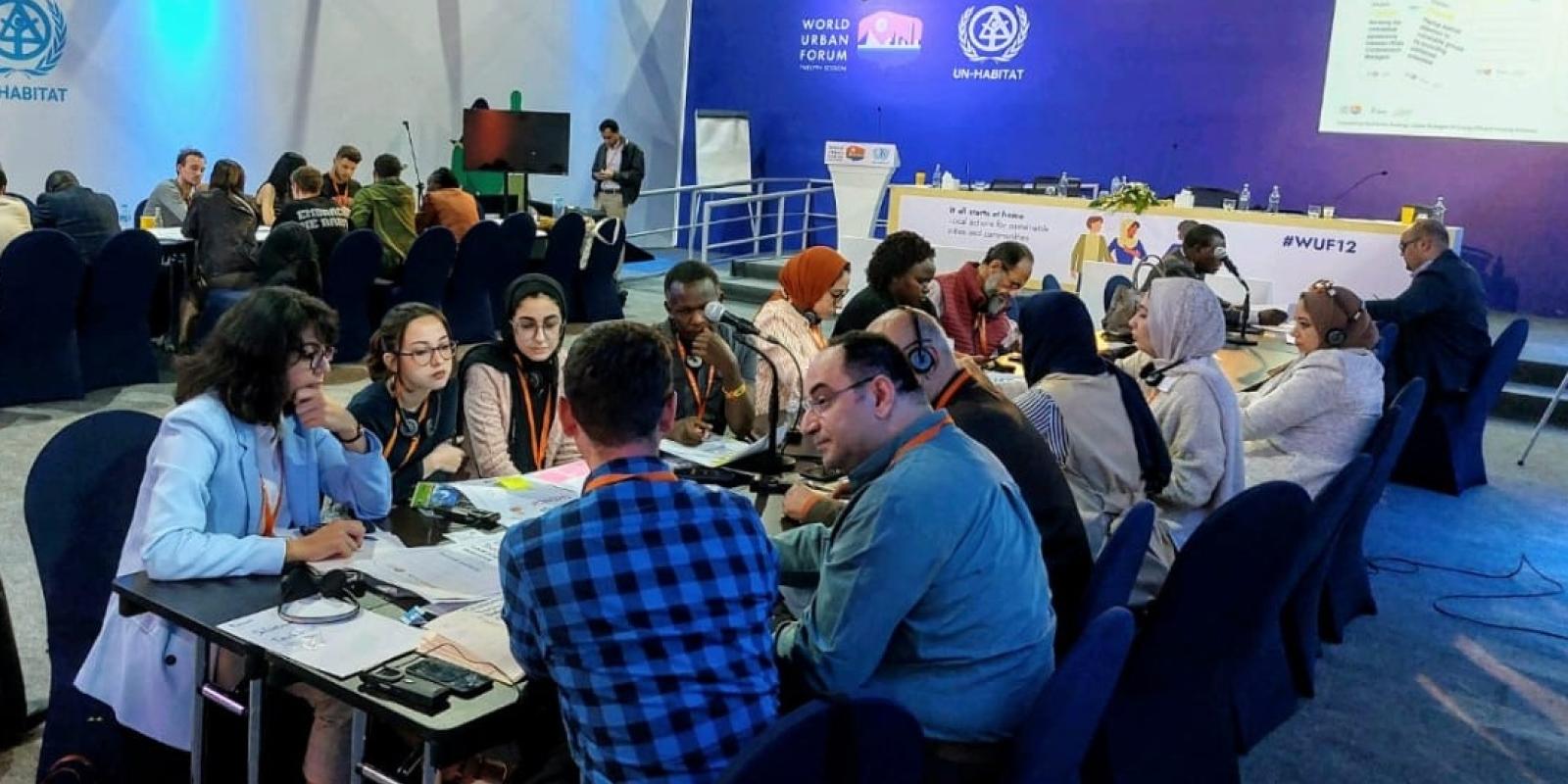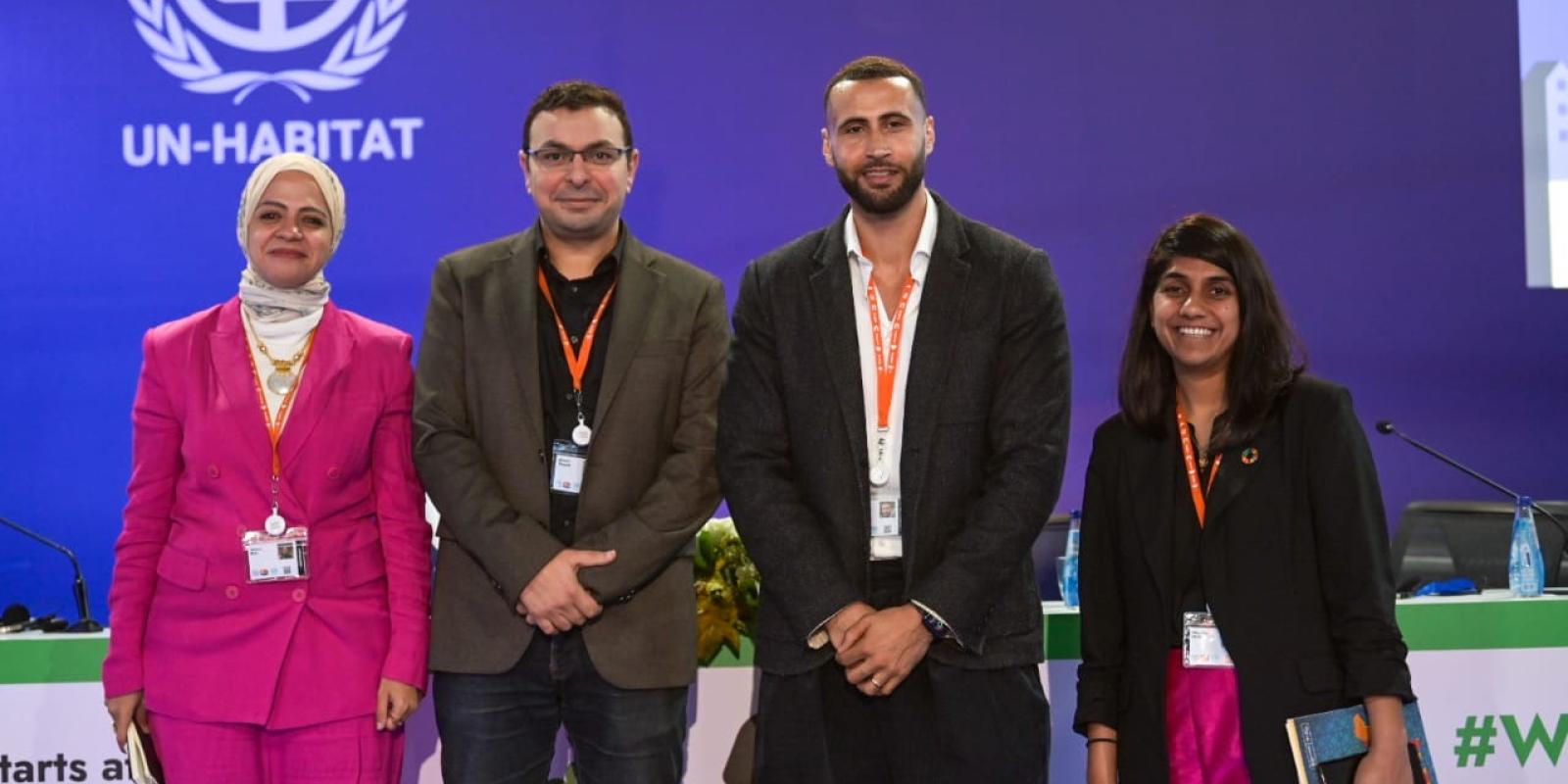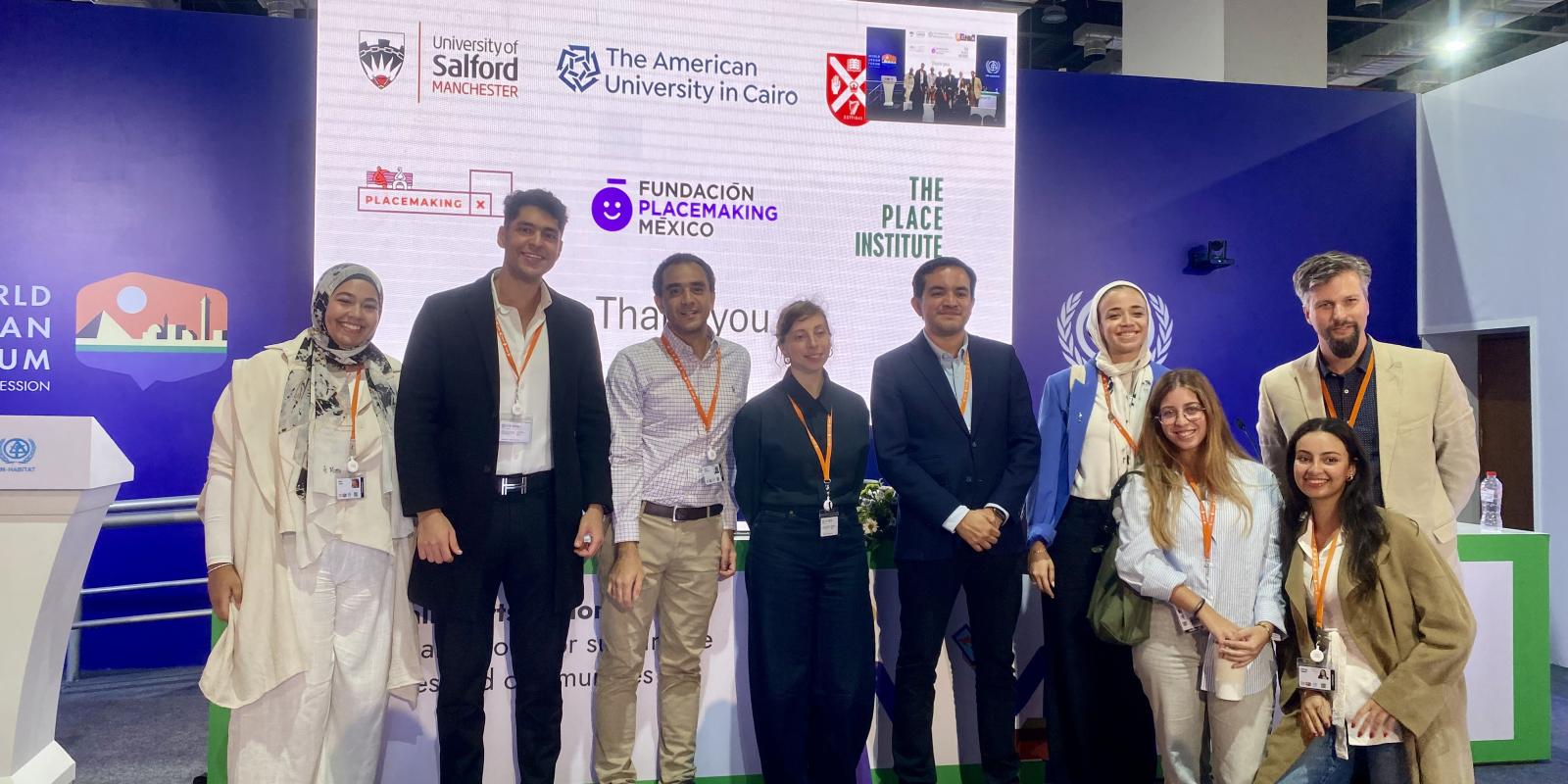
AUCians Excel at World Urban Forum
Addressing contemporary challenges ranging from community-based development to climate action, AUC faculty and students from various disciplines actively engaged in the 12th World Urban Forum (WUF 12), the premier global conference on sustainable urbanization organized by UN-Habitat.
Returning to Africa after more than 20 years since its inception, the forum was held in Egypt for the first time and featured over 24,000 participants from 182 countries. These included representatives of national, regional and international governments; academics; business and community leaders; and civil society organizations.
Advancing Architecture
Faculty from AUC’s Department of Architecture spearheaded discussions on diverse topics and conducted hands-on training sessions. Basil Kamel, professor of architecture and urban theory, and Sherif Goubran ‘14, assistant professor of sustainable design, collaborated with EU-based and regional institutions to deliver a training workshop helping homeowner associations prioritize, optimize and finance retrofits in existing buildings to ensure their resilience to climate uncertainties, emphasizing that retrofitting should not only consider the buildings but the urban space that creates a community as well. “Retrofitting has to be redefined to consider a humane experience that goes beyond the building, extending to a social and communal enhancement,” said Kamel.
"I was incredibly proud to see our students and alumni take the stage at WUF, the world's largest event of its kind. They are truly well-equipped to make a meaningful impact."
Nabil Mohareb, associate professor of spatial analysis and design, conducted a training session for students from national and private universities in Egypt based on sustainable development goals implementation metrics, which map local priorities.
“WUF12 was an excellent opportunity to showcase and share AUC’s innovation as well as its regional and global leadership in questions of urbanity and cities,” said Mohareb. “At the event, AUC faculty and students emerged as thought leaders capable of mediating urban research, knowledge and action between the Global North and Global South.”
As a panelist at the event, Mohareb discussed strategies for embedding climate action into the heart of urban planning, capitalizing on the University’s climate change initiative to integrate knowledge from COP27 into teaching, learning, and research.
“WUF12 was an excellent opportunity to showcase and share AUC’s innovation as well as its regional and global leadership in questions of urbanity and cities."
Goubran led the AUC-hosted Voices from the City session with collaborators from England, Northern Ireland, Mexico and the United States. The event fused the lessons learned from AUC’s Zero-Carbon Future Heritage project with the work of community practitioners utilizing participatory processes for shaping public space, a practice known as placemaking, in the United States, Mexico and globally.
“We were able to highlight the successful future-thinking methodology of our zero-carbon transnational project, which we worked on with Queen’s University Belfast and the University of Salford, and which was showcased at the Venice Biennale,” Goubran said.
For Sara Amin, an architecture senior, the session was a springboard for her graduation project. “This was an incredibly inspiring experience that directly resonated with my dissertation on rethinking Egypt’s street environments to better serve community needs and foster sustainability,” she said. “The forum as a whole demonstrated how academic work, like my own, can translate into practical, impactful solutions on a global scale. It was a fantastic opportunity to witness firsthand how critical design thinking can shape urban spaces to meet the needs of future generations.”
Tamer El Gabaly ’21, a multidisciplinary designer and teaching assistant at AUC, also reflected on how “fascinating” the panel was. “The event was incredibly beneficial, as it provided an opportunity to share our work, engage in meaningful discussions with global experts and reinforce the University’s role in shaping sustainable and inclusive urban futures.”
For El Gabaly, one of his key takeaways is that community participation should go beyond the consultation phase. “The community should be able to have bigger decision-making power when it comes to shaping its built environment,” he affirmed. “This way, cities can grow in ways that truly reflect what the community needs and values.”
Students also showcased their work at the forum. Yara Yousry, an architecture graduating senior and co-founder of the award-winning Bahtinet Project, presented her work in a number of panels. “I was honored to participate [in the event, which] provided an excellent platform for me as a student to discuss how AUC’s education has helped me make a meaningful, real-world impact,” Yousry said. “I shared how the foundation provided by AUC has allowed me to extend SDG concepts beyond campus projects and into global, on-the-ground action, particularly in collaboration with international organizations.”
“The event was incredibly beneficial, as it provided an opportunity to share our work, engage in meaningful discussions with global experts and reinforce the University’s role in shaping sustainable and inclusive urban futures.”
Architecture senior Amina Khairy found the experience to be “transformative.” “I listened to inspiring presentations from leading voices in the field and contributed to a thought-provoking roundtable discussion with professionals and students from diverse backgrounds, all united in exploring how design can reshape urban spaces to foster community and resilience,” she said. “Discussing placemaking, in particular, resonated deeply with me as it highlighted how intentional design can bridge gaps and address shared urban challenges.”
Kanzy Nabil ’24, an architecture alumna who took part in several panels and the Habitat UNI Booth, shared similar sentiments: “[Through our work at AUC], we are contributing to the development and implementation of effective urban policies and strategies that promote sustainable development.”
Multidisciplinary Engagement
Beyond architecture, the forum featured faculty and students from other disciplines, including business and graphic design.
Ahmed Elsayed, associate professor in the School of Business and executive director of the Abdul Latif Jameel Poverty Action Lab Middle East and North Africa housed at AUC, discussed innovative development models. “Urban settings are complex in nature, and understanding what works best is pivotal to addressing the multidimensional challenges of cities, where issues like poverty and social services are interconnected and require precise data-driven solutions,” said Elsayed. “This is what we specialize in at J-PAL.”
Bahia Shehab (MA ’09), professor of practice in graphic design, presented a talk at the panel titled, A Space for All, which examined the role of digital and physical public spaces as hubs for cultural expression, highlighting how art and culture can foster community connections.
Highlighting AUC student and alumni participation in the World Urban Forum, Goubran noted, "I was incredibly proud to see our students and alumni take the stage at WUF, the world's largest event of its kind. They are truly well-equipped to make a meaningful impact."
